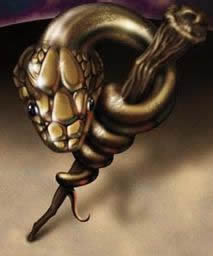Misconception #46
God Sent Serpents After the Children of Israel as They Wandered Through the Wilderness
According to tradition, the God of Israel went to great lengths to induce the king of Egypt to allow the Israelite slaves to leave his country. First, He raised up Moses to lead the people. But when Pharaoh paid no attention to his demands, God sent ten plagues upon the land, inciting the king of Egypt to finally let them go.
Then, having escaped the pursuing Egyptian army by passing through the parted Red Sea, the Israelites began an arduous journey through the Sinai Desert. Before long, though, the people grew weary and began complaining to Moses that God didn’t really know what He was doing by dragging them into the Wilderness with no provision for food or water.
Eventually, God got fed up with the Israelites and their constant complaining, so He decided to punish them by sending venomous snakes into their midst. Savagely bitten, left and right, many of the helpless people were killed. Only after Moses held up a staff of brass, forged in the likeness of a serpent—so that whoever looked at this uplifted staff was cured of their bite—did the suffering finally subside.1
Pretty wild story, don’t you think? Ten plagues descending on the land of Egypt? Israelites escaping through a hole in the Red Sea? Venomous snake bites miraculously cured just by looking at a brass serpent? Can this stuff really be believed?
Well, considering that The Bible is a book full of miracles, the answer is yes we can. But that’s not really the issue that seems so unbelievable to me.
What’s unbelievable is: How could a God so determined to rescue the people of Israel turn against them so abruptly? It seems inconceivable that the Lord would go to such lengths to extricate them from slavery, and then proceed to capriciously mow them down with a bunch of venomous snakes. So what gives? Is there something more to this scenario that we’re not hearing about?
Well, considering the constant forces of disinformation that seek to undermine a correct understanding of The Bible, yes, I do think so. And as usual, to determine what that is, we’ll have to revisit this strange chapter of biblical history.
Story Continues Below
Says Richard Price—the founder and CEO of Academia.edu—on his podcast In Depth With Academia:
Fish Tales (From the Belly of the Whale): Fifty of the Greatest Misconceptions Ever Blamed on The Bible is:
To hear Price’s book review of Fish Tales (From the Belly of the Whale), CLICK HERE.
To hear Kent and Zen Garcia talk about correcting biblical misconceptions, from October 28, 2021, CLICK BELOW.
Story Continues From Above
As we discovered in the previous essay, some four hundred and thirty years before the Exodus out of Egypt, the Israelites had entered the land under the leadership of Jacob and his sons. From a meager band of seventy people, they eventually became a tremendous nation. But once the patriarchs died, the Egyptians were able to regain everything they’d lost to the Israelites. Within a generation or so, they’d succeeded beyond their wildest dreams, reducing a network of once-powerful shepherd-kings into a disintegrated rabble.
Then, after more than three centuries of slavery, God raised up Moses, who reinvigorated them into a band of people who were finally ready to recapture their former glory. In a most startling fashion, the God of Israel struck at the heart of Egyptian power by sending ten plagues, in an attempt to break the will of the belligerent Pharaoh. But again and again, the Egyptian king refused to grant them freedom. Only after the firstborn of every male creature was killed—both human and animal—in what’s now celebrated as the Day of Passover, did Pharaoh relent and free his precious slaves.
At this point, the Israelites made the most famous leg of their journey as Moses led them through the parted Red Sea, where they then found themselves smack dab in the middle of the Sinai Desert. Fortunately for them, Pharaoh’s entire army was drowned in the process, so at least they’d never have to worry about them anymore. What did worry them, though, was: Now that we’re traveling through a desert, with no apparent source of food or water, what will become of us? Just three days removed from the Red Sea, the people began to complain to Moses that there was no water. Immediately God had Moses lead them to two sources of water, first at Marah, where God sweetened waters that were originally too bitter to drink, and then to Elim, where the people found twelve wells from which to drink.2
Soon after, they began complaining that because there was no food to be found God might as well have left them to die in Egypt where they at least didn’t have to contend with empty bellies. In response to their grumblings, God sent vast numbers of quail into their midst to feed them. Not only that, He provided them with a peculiar substance known as manna, a kind of bread that tasted like honey-filled wafers, which grew out of the ground as a form of plant life, with which the people satisfied their hunger.3
The ironic thing about this series of events is, in hindsight it’s obvious to us that the Lord was testing the faith of this fickle bunch of exiles. One minute the Israelites are about to be killed by Pharaoh’s pursuing army, the next minute the Red Sea collapses on them and they’re happy with God—for a while, that is.
Then, no sooner are they past the next series of trials, having been provided for with sweetened water, twelve wells, quail, and manna, the people find themselves without water yet again. But instead of giving God the benefit of the doubt, by having faith in Him and His ordained leader, what do they do?
The people began to chide with Moses, saying, “How about giving us more water to drink?”
And Moses replied, “Why are you giving me such a hard time? You’re only irritating God with your belligerence!”
But the people were so thirsty that they continued to press the matter, saying, “Is this why you brought us out of Egypt? So you could kill us and our cattle with thirst?”
So Moses begged God: “What should I do with these people? They all want to stone me!”
And the Lord told Moses: “Take the rod with which you parted the Red Sea and strike the rock in the sight of everyone.”
And water came forth from the rock in order to quench the thirst of the Israelites. That’s why Moses named that place Meribah, (which means provocation, or strife) because that was where the Israelites questioned whether or not the Lord was still with them.4








